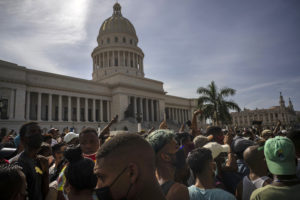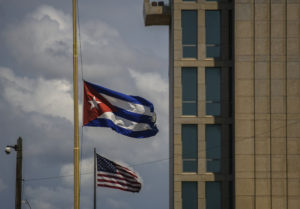Press Release
April 14, 2015
Washington, D.C.—Today the White House announced that the President is removing Cuba from the list of state sponsors of terrorism, and that it has transmitted a formal notification to Congress.
“Taking Cuba off the list of terrorist states is a sensible, and long overdue step,” said Geoff Thale, Director of Programs at the Washington Office on Latin America (WOLA), a research and advocacy organization with over two decades of experience on Cuba issues.
“Whatever U.S. and Cuban differences, the Cuban government has not been a supporter of terrorism. Taking Cuba off the list will remove an unnecessary irritant in the relationship, and perhaps allow us to discuss the real differences we do have in a more serious way. It should help pave the way for normal diplomatic relations,” Thale said.
The removal of Cuba from the list of state sponsors of terrorism is both a necessary step towards opening a U.S. embassy in Havana as well as part of President Obama’s deeper process of updating U.S. policy towards Cuba for the 21st century.
Cuba was originally placed on the list in 1982 on the grounds that it supported armed revolutionary movements in the Americas during the Cold War. A telling indicator of this policy’s inapplicability is the fact that the brief section on Cuba in the last State Department report on the issue contains less than 200 words. The report points out “there was no indication that the Cuban government provided weapons or paramilitary training to terrorist groups.”
Far from a source of regional or global instability, in recent years Cuba has facilitated a peace process between the Colombian government and the Revolutionary Armed Forces of Colombia (FARC). As a result, the Havana-based Colombian peace talks seem well-poised to end that country’s 50-year armed conflict—the longest standing armed conflict in the hemisphere.
“This decision aligns U.S. policies with the realities of today, and it communicates a new approach to the whole region. This announcement paves the way for additional changes in the process of normalizing relations with Cuba,” said Thale.
This announcement comes in the wake of a historic Summit of the Americas, when Cuba participated for the first time, and President Obama and Castro met face-to-face. It is expected that the countries move forward to open up embassies soon.


